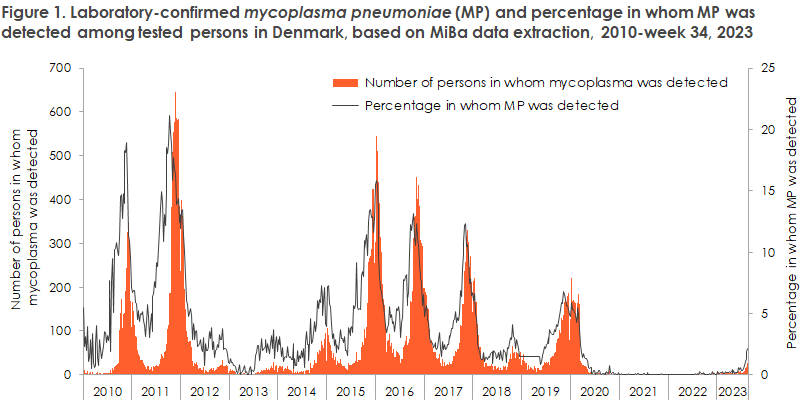No 35 - 2023
Increased occurrence of Mycoplasma pneumoniae
Five new measles cases
Increased occurrence of Mycoplasma pneumoniae
Since the lock-down of Denmark, due to COVID-19 in March 2020, Mycoplasma pneumoniae (MP) has been largely absent as only sporadic cases have been detected. Data from 2010 to March 2020 show that the MP epidemics often spanned 2-3 seasons, after which the occurrence remained at a low level in the following autumn and winter months until the next epidemic, Figure 1.
Following 3½ years with none or only very few weekly detected MP cases, 28 and 34 persons with MP, respectively, were detected in weeks 33 and 34 . The detected cases were recorded in all parts of Denmark. The number of cases is limited, but it is important to remain attentive to MP when patients see their general practitioner with airway infections or bronchitis. In previous seasons, the infection was detected most frequently in children aged 6-12 years with some infection being passed on to their parents. However, the low occurrence recorded in the past 3½ years may mean that other age groups are now susceptible to the infection.
Treatment-requiring MP infection cannot be managed with penicillin, but with macrolide or, alternatively, tetracycline.
For further information on clinical tests and treatment, please see the Disease Dictionary on MP (Danish: Sygdomsleksikon).
(H.-D. Emborg, Department of Infectious Disease Epidemiology and Prevention) and S.A. Uldum and J.S. Jensen, Department of Bacteria, Parasites & Fungi)

Five new measles cases
In week 33, one measles case was notified, whereas week 34 saw a total of four cases notified.
The first case is associated with a previously detected case in the Central Denmark Region, who was infected while travelling to a European country (not specified in pursuance of GDPR regulations), EPI-NEWS no. 32-33/2023. The case is laboratory-confirmed at DCM Aarhus University Hospital by PCR diagnostics.
The other four cases are associated with a previously detected case in the Region of Southern Denmark who was infected while travelling in the same European country, EPI-NEWS 32-33/2023. These cases were notified with clinical symptoms consistent with measles and contact to a laboratory-verified case. No samples were taken.
The described secondary cases are all associated with previously detected cases in the same families, and no specific knowledge suggests that the new cases have exposed persons beyond these families to infection. Measles is very infectious and doctors in the two affected regions should remain attentive to patients with symptoms that are consistent with measles and ensure that examination and sampling are completed in a manner that avoids unwittingly exposing other patients to infection.
(M.K. Thomsen, DCM, Aarhus University Hospital, K. T. Franck, Virus Monitoring & Research, National Reference Laboratory for Measles and Rubella, L.K. Knudsen, P.H. Andersen, Department of Infectious Disease Epidemiology and Prevention, D. Halmes, Danish Patient Safety Authority, Supervision and Guidance West)